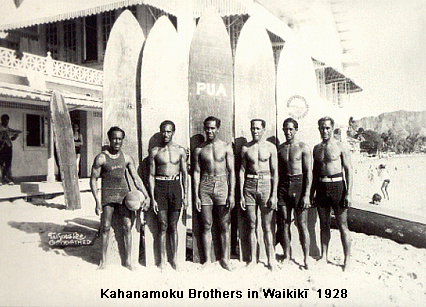The first surfers were women: The amakua (guardian)
shark god Kamohoali'i taught the Hawaiian Fire Goddess Pele how to surf;
Pele taught her sister Hi'iaka and soon the men got involved.
The Hawaiian sport of surfing was practiced the the
ali'i (chiefs) at a time when the rest of the world had a real fear of
the ocean. William Ellis notes in 1820: Surf Boarding. ...
"a frequent game is swimming in the surf. The higher
the sea and the larger the waves, in their opinion the better the
sport. They use a board, which they call papa he naru (wave
sliding-board), generally five or six feet long, and rather more
than a foot wide, sometimes flat, but more frequently slightly
convex on both side. It is usually made from the wood of the
erythina, stained quite black, and preserved with great cars. After
using, it is placed in the sun till perfectly dry, when it is rubbed
over with coconut oil, frequently wrapped in cloth, and suspended in
some part of their dwelling house.
They generally prefer a place where the deep water
reaches to the beach, but prefer a part where the rocks are ten to
twenty feet under water, and extend to a distance from shore, as the
surf breaks more violently there. When playing in these places, each
individual takes his board and pushing it before him, swims perhaps
a quarter of a mile or more out to sea. They do not attempt to go
over the billows which roll towards the shore, but watch their
approach, and dive under water, allowing the billow to pass over
their heads.
When they reach the outside of the rocks, where the
waves first break, they adjust themselves on one end of the board,
lying flat on their faces, and watch the approach of the largest
billow; they then poise themselves on its highest edge, and paddling
as it were with their hands and feet, ride on the crest of the wave
in the midst of the spray and foam, till within a yard or two of the
rocks or the shore; and when the observers would expect to see them
dashed to pieces, they steer with great address between the rocks,
or slide off their board in a moment, grasp it by the middle, and
dive under water, while the wave rolls on, and breaks among the
rocks with a roaring noise, the effect of which is greatly
heightened by the shouts and laughter of the natives in the water.
Those who are expert frequently change their
position on the board, sometimes sitting and sometimes standing
erect in the midst of the foam. The greatest address is necessary in
order to keep on the edge of the wave: for it they get too forward,
they are sure to be overturned; and if they fall back, the are
buried beneath the succeeding billow."
In 1870, Jack London wrote in Learning Hawaiian Surfing,
a Royal Sport:
" that is what it is, a royal sport for the natural
kings of the earth. The waves are a mile long, these bull-mouthed
monsters, and the weigh a thousand tons, and they charge in to shore
faster than a man can run. A man has bitted the bull-mouthed breaker
and redden it in, and pride in the feat shows in the carriage of his
magnificent body. He is a Kanaka-and more, his is a man, a member of
the kingly species that has mastered matter and the brutes and
lorded it over creation.
Go strip off your clothes that are a nuisance in
this mellow clime. Get in and wrestle with the sea; wing your heels
with the skill and power that reside in you, bit the sea's breakers,
master them, and ride upon their backs as a king should do."
 In
the 1930'S, Duke Kahanamoku, Hawaiian Olympic Medalist and Surfer
introduced modern surfing to the world.
In
the 1930'S, Duke Kahanamoku, Hawaiian Olympic Medalist and Surfer
introduced modern surfing to the world.
Today, surfing is an international sport, the North
Shore of O'ahu its Mecca, and site of the final leg of the World
Championship Series at Pipeline and Sunset Beach in December.
Windsurfing and sky surfing have taken this ancient sport of kings to
new dimensions.
The chiefs of old would have approved.
 In
the 1930'S, Duke Kahanamoku, Hawaiian Olympic Medalist and Surfer
introduced modern surfing to the world.
In
the 1930'S, Duke Kahanamoku, Hawaiian Olympic Medalist and Surfer
introduced modern surfing to the world.